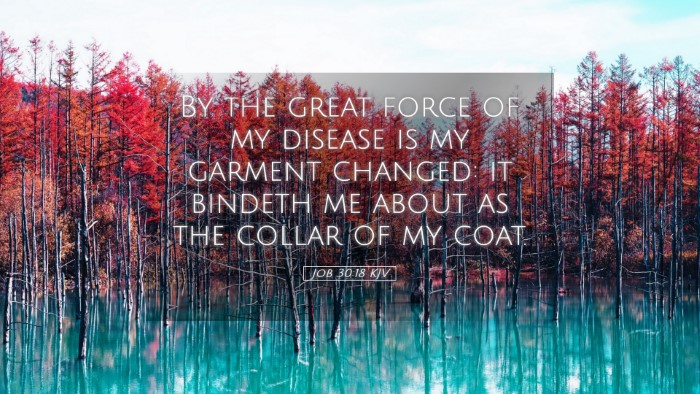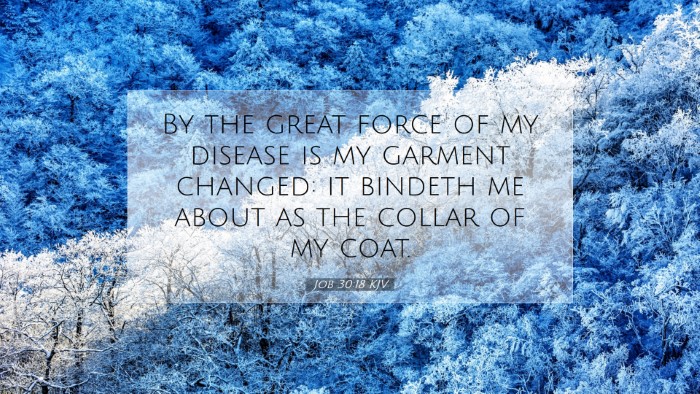Commentary on Job 30:18
Verse: "By the great force of my disease is my garment changed: it bindeth me about as the collar of my coat." (Job 30:18)
Contextual Overview
This verse is situated in a profound moment within the book of Job, where Job recounts his suffering and the drastic changes in his once-respected life. As a man who has lost everything, including health, wealth, and the support of friends, Job articulates how his physical state has led to a transformation of his identity and condition. It is critical to analyze this verse within the broader narrative of despair and loss that characterizes much of Job's discourse.
Insights from Public Domain Commentaries
Matthew Henry's Commentary
Matthew Henry emphasizes the dramatic shift in Job's condition from prosperity to abject misery. He interprets the 'garment' as symbolic of Job's former dignity and status. His affliction—being likened to a heavy burden—affects both his physical form and his standing in society. Henry notes that the 'force of my disease' indicates that Job feels overwhelmed and suffocated by his suffering, suggesting an internal struggle that mirrors his external trials.
Albert Barnes' Notes on the Bible
Albert Barnes expands on the metaphor of the garment. He suggests that garments change with circumstance; they are indicators of one's situation. Job's references to his 'garment' signal not just physical pain but a transformation in his spiritual life as well. His anguish is so great that it constricts him psychosomatically, reminding readers how suffering can alter one’s perception and reality. Barnes highlights that Job sees his suffering as not merely a physical ailment, but as a metamorphosis of his entire being, affecting body, soul, and spirit.
Adam Clarke's Commentary
Adam Clarke applies a theological lens to this passage, considering how Job's suffering serves as a means of testing his righteousness. Clarke suggests that the 'collar of my coat' symbolizes restrictions imposed by suffering that are not merely physical but also spiritual and emotional. He poses that this imagery conveys how deeply Job feels confined by his misery, almost as if it encircles him tightly without escape. Furthermore, Clarke connects this to the broader themes of perseverance and faith under trial, advocating that suffering, while profound, may lead to deeper insights about one’s relationship with God.
Theological Implications
This verse raises significant theological questions about the nature of suffering. It challenges the reader to consider how God may use affliction for greater purposes, emphasizing the transformative power of suffering in driving individuals closer to divine truths. The compression of Job's garment and the 'collar of his coat' metaphor encourage theological reflection on how trials can reveal character, shape faith, and provide opportunities for deep spiritual growth.
Pastoral Application
For pastors and spiritual leaders, Job 30:18 serves as a poignant reminder of the realities many congregants face. Understanding the symbolism of garments can enhance pastoral care, guiding leaders to acknowledge their parishioners' struggles authentically. This passage can be a source of comfort, as it demonstrates that even great men of faith experience profound suffering. Pastors may utilize this verse to identify with those in their flock, offering empathy and a reminder that God hears the cries of the afflicted.
Conclusion
Job 30:18 encapsulates the essence of human suffering and the profound weight it carries upon the human spirit. Through the insightful observations of esteemed commentators, we glean a richer understanding of its implications for faith, resilience, and divine purpose. The exploration of this verse invites us to contemplate how suffering intertwines with identity, calling us to be both compassionate bearers of hope and stewards of faith amidst adversity.


